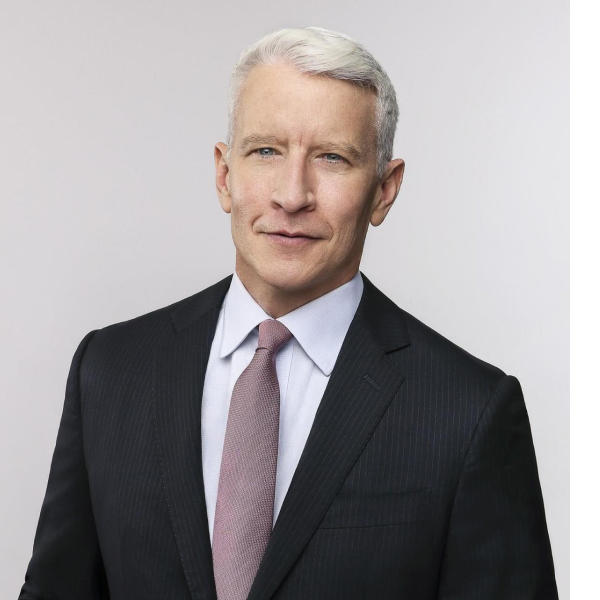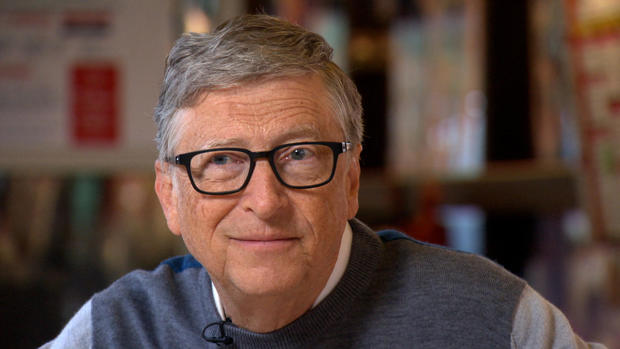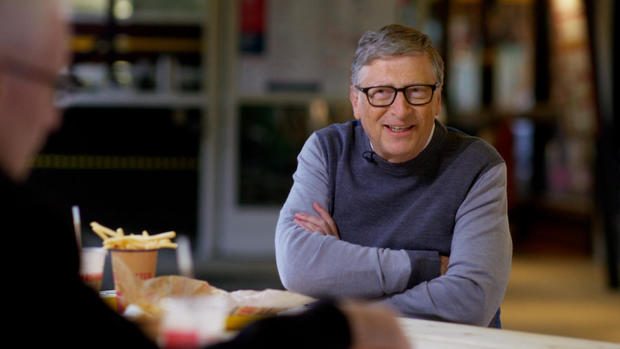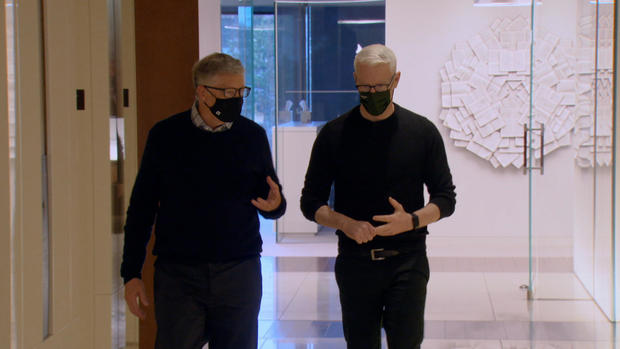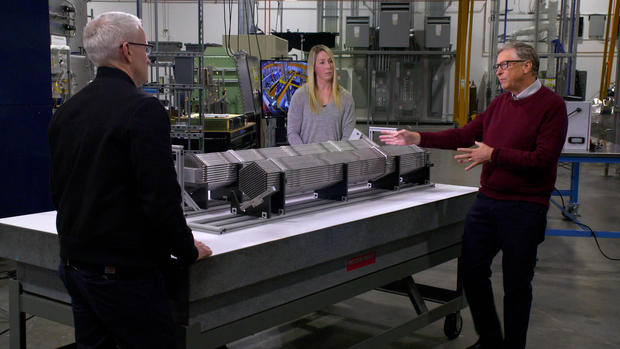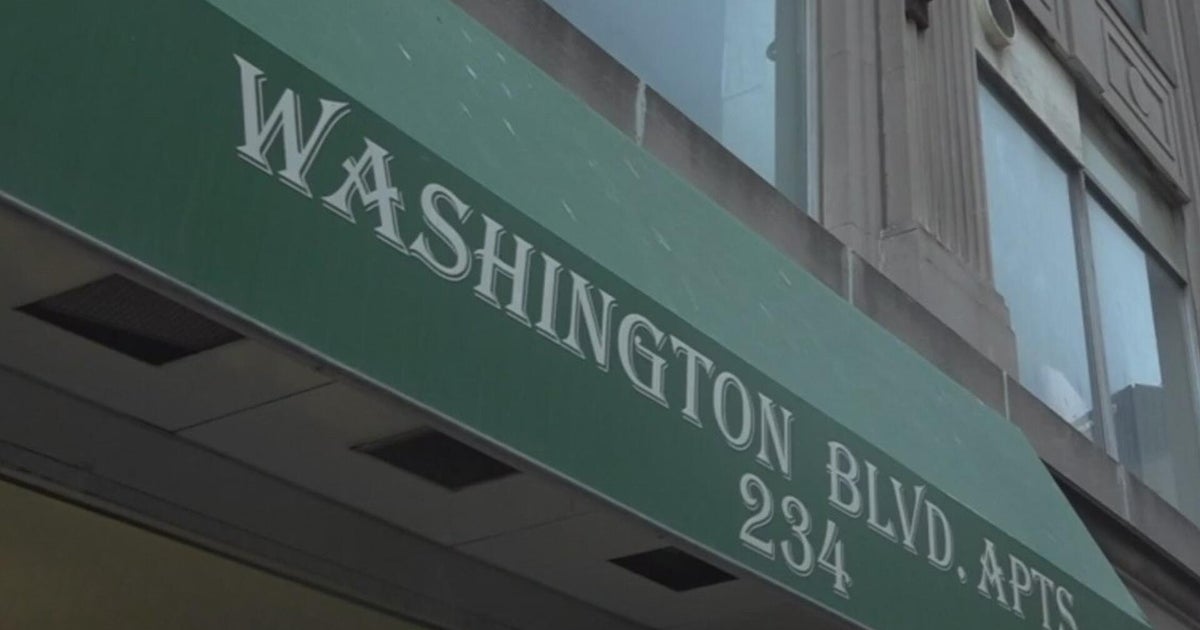Bill Gates: How the world can avoid a climate disaster
Bill Gates helped usher in the digital revolution at Microsoft, and has spent the decades since exploring - and investing in - innovative solutions to some of the world's toughest problems - global poverty, disease, and the coronavirus pandemic, which he's spent nearly $2 billion on.
Now he is focusing on climate change, agreeing with the overwhelming majority of scientists who warn of a looming climate disaster. The good news is Gates believes it's possible to prevent a catastrophic rise in temperatures. The bad news? He says in the next 30 years we need scientific breakthroughs, technological innovations and global cooperation on a scale the world has never seen.
Anderson Cooper: You believe this is the toughest challenge humanity has ever faced?
Bill Gates: Absolutely. The amount of change, new ideas. It's way greater than the pandemic. And it needs a level of cooperation that would be unprecedented.
Anderson Cooper: That doesn't sound feasible--
Bill Gates: No, it's not easy. But hey, we have 30 years--
Anderson Cooper: It sounds impossible.
Bill Gates: We have more educated people than ever. We have a generation that's speaking out on this topic. And, you know, I got to participate in the miracle of the personal computer and the internet. And so, yes, I have a bias to believe innovation can do these things.
He is talking about innovations in every aspect of modern life - manufacturing, agriculture, transportation, because nearly everything we now do releases earth warming greenhouse gases, mainly carbon dioxide, into the atmosphere. He took us to his favorite burger joint in Seattle to explain.
Anderson Cooper: You're talking about changing everything in the economy, I mean, every aspect of it--
Bill Gates: In the phy-- yeah, the physical--
Anderson Cooper: So--
Bill Gates: --economy--
Anderson Cooper: Of what we can see right now, of us sitting around here, what specifically would be impacted?
Bill Gates: Well, this cement would be made in a different way. The steel in the building would be different. You know, the meat in the burgers a big deal. These-- you know, all this plastic and paper--potatoes.
Anderson Cooper: With potatoes you're talking about fertilizer, the irrigation system that's used.
Bill Gates: All the tractors, the transport.
Anderson Cooper: The trucks that bring them to this restaurant, all that has to change?
Bill Gates: Hey, when you're going to zero, you don't get to skip anything.
Gates says going to zero means eliminating all greenhouse gas emissions. Or else...
Anderson Cooper: If they wait 100 years to do this…
Bill Gates: It's way too late. Then the natural ecosystems will have failed. The instability, you know, the migration. You know, those things will-- will get really, really bad well before the end of the century.
Anderson Cooper: When you talk about migration, you're talking about hundreds of thousands of people trying to move from North Africa to Europe every year?
Bill Gates: Exactly. The Syrian War was a 20th of what climate migration will look like. So, the deaths per year are way, ten times greater than-- than what we've experienced in the pandemic.
In a new book "How to Avoid a Climate Disaster." Gates outlines all the solutions he believes we need.
He says the U.S. has to lead the world getting to zero greenhouse gas emissions by 2050. He supports President Biden's decision to rejoin the Paris Climate Agreement, but is asking the administration to massively increase the budget for climate and clean energy research to $35 billion a year.
Anderson Cooper: You've said that governments need to do the hard stuff, but not just go after the low-hanging fruit. What-- what's low-hanging fruit?
Bill Gates: Passenger cars, part of the electric generation with renewables. The things everybody knows about, that's getting almost all the money, not the hard parts, which is the industrial piece including the steel and cement. Those pieces we've hardly started to work on.
No one thinks much about cement and steel, but making it accounts for 16% of all carbon dioxide emissions. And the demand is only growing. The world will add an estimated two and a half trillion square feet of buildings by 2060 -- that's the equivalent of putting up another New York City every month for the next 40 years.
So one innovative company Gates has been pouring money into is CarbonCure. They inject captured carbon dioxide into concrete.
Bill Gates: What they do is they stick CO2 in here in the cement, and they mix them up. And so, you're able to actually get rid of some CO2 by sticking it in the cement. Right now they get rid of about 5%. But they have a next generation that can get to 30%.
Anderson Cooper: The carbon has been just injected into this so it's captured it. So, it's not gonna be released into the atmosphere.
Bill Gates: That's right.
Gates has already invested $2 billion of his own money on new green technologies, and plans to spend several billion more.
In 2016 he also recruited Jeff Bezos, Mike Bloomberg and nearly two dozen other wealthy investors to back a billion-dollar fund called "breakthrough energy ventures," making long-term, often risky investments in promising technologies.
Gates regularly consults with the fund's team of top scientists and entrepreneurs who've so far invested in 50 companies with cutting edge ideas to reduce carbon emissions.
Anderson Cooper: What's like, the most far-flung idea you've backed?
Bill Gates: There's one that's so crazy it's even hard to describe.
Anderson Cooper: Wait a minute, it's so crazy it's hard to describe?
Bill Gates: Even f-- yeah.
Anderson Cooper: How do you pitch that--
Bill Gates: And--
Anderson Cooper: -to investors?
Bill Gates: Well, they find geological formations, and they just pump water down into them. The energy they've used to pump it in, then they can draw that energy back out. So it's-- it's a water pressure storage thing, which, you know, when I first saw it I thought, "That can't work." But--
Anderson Cooper: But you gave money to it?
Bill Gates: Yeah, lots of money.
Because cows account for around 4% of all greenhouse gases, Gates has invested in two companies making plant based meat substitutes, impossible foods and beyond meat. But farming the vegetables used to make many meat alternatives emits gases as well, so Gates is also backing a company that's created an entirely new food source.
Bill Gates: This company, Nature's Fynd, is using fungis. And then they turn them into sausage and yogurt. Pretty amazing.
Anderson Cooper: When you say fungi, do you mean like mushroom or a microbe?
Bill Gates: It's a microbe.
The microbe was discovered in the ground in a geyser in Yellowstone National Park. Without soil or fertilizer it can be grown to produce this nutritional protein -- that can then be turned into a variety of foods with a small carbon footprint.
Bill Gates: This is the yogurt.
Anderson Cooper: Oh this is good.
Bill Gates: Wow.
Anderson Cooper: I've had, like, cashew yogurt or oat yogurt. It's-- it's sort of along those lines.
Bill Gates: Yeah, with the burgers, they're, you know, like Beyond and Impossible, they're getting close to the real thing, but you can still tell. These I'm not sure I could've tell-- now I'm-- I'm more of a burger expert than I am then a yogurt expert.
Gates never planned to focus on climate change, but while working in Africa with the foundation he started with his wife, Melinda, in 2000, he came to see just how vulnerable those in developing countries are to the effects of rising temperatures.
So 15 years ago Gates started educating himself on climate change, bringing scientists and engineers to his office in Seattle for what he calls "learning sessions." He also reads voraciously, books and binders full of scientific research.
Bill Gates: Yeah, so this is the most recent one, which is about clean hydrogen.
Anderson Cooper: So you're reading thousands of pages every few days on topics?
Bill Gates: Yeah. My reading is, is key. and then asking questions when it doesn't make sense.
Gates isn't just looking to cut future carbon emissions, he is also investing in direct air capture, an experimental process to remove existing CO2 from the atmosphere. Some companies are now using these giant fans to capture CO2 directly out of the air, Gates has become one of the world's largest funders of this kind of technology.
But of all his green investments, Gates has spent the most time and money pursuing a breakthrough in nuclear energy -- arguing it's key to a zero carbon future.
He says he's a big believer in wind and solar and thinks it can one day provide up to 80% of the country's electricity, but Gates insists unless we discover an effective way to store and ship wind and solar energy, nuclear power will likely have to do the rest. Energy from nuclear plants can be stored so it's available when the sun isn't shining and the wind isn't blowing.
Anderson Cooper: Were you always a big proponent of nuclear?
In 2008 he founded TerraPower, a company that has re-designed a nuclear reactor.
Anderson Cooper: This is your prototype?
Bill Gates: Exactly. TerraPower's Natrium Reactor. This is a rendering, we haven't built it yet. But here's the nuclear island right here.
Anderson Cooper: This is the reactor?
Bill Gates: Exactly.
Gates says TerraPower's reactor is less expensive to build, produces less waste and is fully automated, reducing the potential for human error. Gates and director of engineering Lindsey Boles showed us what they say is another key to its safety.
Anderson Cooper: What is it that we're looking at here?
Lindsey Boles: So these individual fuel pins are actually where the uranium fuel is. And that's what generates all the heat in our natrium reactor.
Anderson Cooper: This is what everybody is worried about?
Lindsey Boles: Yes, exactly.
Bill Gates: In a normal reactor, it's water that's flowing past and heating up. And it'll boil and-- and generate a lot of high pressure.
That high heat and pressure can cause an explosion, like in Chernobyl in 1986 when radioactive material was spread for thousands of miles.
But Gates says the TerraPower reactor won't use water to cool down the fuel rods -- they plan to use liquid sodium.
Bill Gates: The liquid sodium can absorb a lot more heat. And so we-- we don't have any high pressure inside the reactor.
In October, the Department of Energy awarded TerraPower $80 million to build one of the first advanced nuclear reactors in the U.S.
Bill Gates: Nuclear power can be done in a way that none of those failures of the past would recur, because just the physics of how it's built. I admit, convincing people of that will be almost as hard as actually building it. But since it may be necessary to avoid climate change, we shouldn't give up.
Anderson Cooper: You've been criticized for being a technocrat, saying technology is the only solution for-- for tackling climate change. There are other people that say, "Look, the solutions are already there. It's just government policy is what really needs to be focused on.
Bill Gates: I wish that was true. I wish all this funding of these companies wasn't necessary at all. Without innovation, we will not solve climate change. We won't even come close.
Gates credits young activists for keeping climate change in the headlines. But he knows some consider him an imperfect ally.
Anderson Cooper: Are you the right messenger on this? Because you fly private planes a lot. And you're creating a lot of greenhouse gases yourself.
Bill Gates: Yeah. I probably have one of the highest greenhouse gas footprints of anyone on the planet. You know, my-- my--
Anderson Cooper: It's kind of ironic.
Bill Gates: --personal flying alone is gigantic. Now, I'm spending quite a bit to buy aviation fuel that was made with plants. You know, I switched to an electric car. I use solar panels. I'm paying a company that actually at a very high price, can pull a bit of carbon out of the air and stick it underground. And so I'm offsetting my personal emissions.
Anderson Cooper: Those are called carbon offsets?
Bill Gates: Right. So you know, it's costing like $400 a ton. It's like $7 million.
Anderson Cooper: So you're paying $7 million a year to offset your carbon footprint?
Bill Gates: Yup.
He's encouraging others who can afford it to buy carbon offsets and green products so that what he calls "the green premium," the added production cost for reducing carbon emissions, will go down and quality of products up -- driving the innovations that may get us to zero.
Anderson Cooper: It just seems overwhelming if every aspect of our daily life has to--
Bill Gates: It--
Anderson Cooper: --change.
Bill Gates: It can seem overwhelming.
Anderson Cooper: But you are optimistic?
Bill Gates: Yeah. There are days when it looks very hard. If people think it's easy, they're wrong. If people think it's impossible they're wrong.
Anderson Cooper: It's possible.
Bill Gates: It's possible. But it'll be the most amazing thing mankind has ever done.
Anderson Cooper: That's what it has to be?
Bill Gates: Yeah. It's an all-out effort, you know, like a world war, but it's us against greenhouse gases.
Produced by Denise Schrier Cetta and Katie Brennan. Associate producer, Sara Kuzmarov. Broadcast associate, Annabelle Hanflig. Edited by Stephanie Palewski Brumbach.
